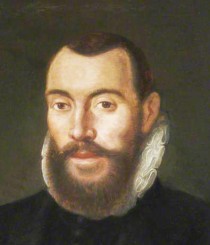
Samuel Ward was born at Haverhill, in Suffolk, in the year 1577, and was eldest son of the Rev. John Ward, minister of the gospel in that town. He was admitted a scholar of St John’s College, Cambridge, on Lady Margaret’s foundation, on Lord Burghley’s nomination, November 6, 1594, and went out B.A. of that house in 1596. He was appointed one of the first fellows of Sidney Sussex College in 1599,1 commenced M.A. 1600, vacated his fellowship on his marriage in 1604, and proceeded B.D. in 1607.
Nothing is known of Ward’s boyhood and youth. His entrance on the work of the ministry, the name of the bishop by whom he was ordained, the date of his ordination, the place where he first began to do Christ’s work as a preacher, are all things of which apparently there is no record. His first appearance as a public character is in the capacity of lecturer at his native town of Haverhill, where he seems to have enjoyed some success and seen conversions.
From Haverhill, Samuel Ward was removed, in 1603, at the early age of twenty-six, to a position of great importance in those days. He was appointed by the Corporation of Ipswich to the office of town preacher at Ipswich, and filled the pulpit of St Mary-le-Tower, in that town, with little intermission, for about thirty years. Ipswich and Norwich, it must be remembered, were places of far more importance four hundred years ago, than they are at the present day. They were the capital towns of two of the wealthiest and most thickly peopled counties in England. Suffolk, in particular, was a county in which the Protestant and evangelical principles of the Reformation had taken particularly deep root. Some of the most eminent Puritans were Suffolk ministers. To be chosen town preacher of a place like Ipswich, four hundred years ago, was a very great honour, and shows the high estimate which was set on Samuel Ward’s ministerial character, even when he was so young as twenty-six. It deserves to be remarked that Matthew Lawrence and Stephen Marshall, who were among his successors, were both foremost men among the divines of the seventeenth century.
The influence which Ward possessed in Ipswich appears to have been very considerable during his thirty years’ ministry there. Although prosecuted by Bishop Harsnet for nonconformity in 1623, Ward was only suspended temporarily, if at all, from his office as preacher. Ward was one of the scholars involved with the translation and preparation of the King James Version of the Bible (but see Note 1).
After eleven years of comparative quiet, Ward was prosecuted again for alleged nonconformity, at the instigation of Archbishop Laud. He was found guilty, was enjoined to make a public recantation in such form as the Court should appoint, and condemned in costs of the suit. Upon his refusal to recant, he was committed to prison. Ward was held in such high esteem that after his suspension the Bishop of Norwich would have allowed his people another minister in his place; but ‘they would have Mr Ward, or none’!
After his release from prison, Ward is said to have retired to Holland, where he became a colleague of William Bridge, the famous Independent minister of Yarmouth, who had settled at Rotterdam. Ward’s stay at Rotterdam could not have been very lengthy. He was not committed to prison till 1635, and in 1638 we find him buying a house in Ipswich. It is plain, at this rate, that he could not have been very long in Holland.
Samuel Ward died in the month of March 1639, aged 62; and was buried in St Mary-le-Tower, Ipswich. Ward married, in 1604, a widow named Deborah Bolton, of Isleham in Cambridge, and had by her a family. The town books of Ipswich record that after his death, as a mark of respect, his widow and his eldest son Samuel were allowed for their lives the stipend enjoyed by their father, viz., £100 annually.
The Trust publishes the Sermons of Samuel Ward and an extract from these in the Pocket Puritans series, Living Faith. These include Bishop J. C Ryle’s ‘Memoir of Samuel Ward’, from which most of the above information is taken.
[The author image is from a painting of Ward by Gustavus Ellinthorpe Sintzenich, by kind permission of Mansfield College, Oxford.]
